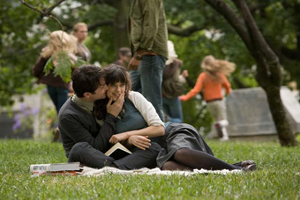The
Curious Case of Benjamin Button
Fantastic Mr. Fox
Gran Torino
Harry Potter and the Half Blood Prince
The Hurt Locker
The
Informant!
Julie and Julia
Milk
The Reader
Serious Man
Film Reviews from 2008
Film
Reviews from 2007
Film Reviews
from 2006
(500) Days of Summer
These questions are at the heart of the new film, (500) Days of Summer. Tom is a writer and designer of greeting cards. One day he meets Summer, a new assistant at the office. He finds Summer attractive, and asks her out. She wants to be friends, but Tom wants more. Throughout the film the two have difficulty deciding what they want their relationship to be and where they want it to go. In this respect, Tom and Summer are like many contemporary young couples. I’m not revealing anything you won’t find out in the first few minutes of the movie by saying that the relationship does not work out. The opening of the film describes it as “A story about love, but not a love story.” That sums it up pretty well. Writers Scott Neustadter and Michael Weber and director Marc Webb have more to say about the difficulties of relationship than about a conventional “boy meets girl” love story.
The unconventional storytelling could just be another gimmick if the move wasn’t so very entertaining. We watch Tom and Summer navigate the relational waters of their lives from highs to lows and everything in between. In its non-chronological order, it’s hard to tell what’s coming next. Yet, I suspect Tom and Summer have a hard time telling from day to day how they are going to feel. Tom laments that it’s easier for a greeting card to use a catchy phrase to capture a feeling than for a person to actually talk about their emotions. Pop culture references abound from the last forty years, from the Beatles and The Graduate to contemporary references. Music is used well to underscore the emotions. Hall and Oates’ bouncy hit from the 80’s, “You Make My Dreams Come True,” is the hilarious highlight of the film, as Tom’s emotional high becomes a classic Hollywood musical number, complete with unsuspecting pedestrians breaking into dance, and even an animated bluebird to sing along. I enjoyed (500) Days of Summer for its insight, wit, and cleverness. The cleverness never becomes cynical, and it is balanced by a real depth of feeling for the young friends/lovers in the midst of their relationship. Despite its distinctly bittersweet tone, 500 Days ends with a ray of hope that Tom and Summer can learn from their 500 days and move on to lasting relationships. Let’s hope so. Tom Condon, OP
|



 Relationships are confusing, perhaps more now than ever. A man meets a woman. They go out a few times. They start out as friends. How and when do they become “a couple”? Do they just like one another? What if the relationship becomes sexual? What happens when one is more serious about the relationship than the other?
Relationships are confusing, perhaps more now than ever. A man meets a woman. They go out a few times. They start out as friends. How and when do they become “a couple”? Do they just like one another? What if the relationship becomes sexual? What happens when one is more serious about the relationship than the other? The novelty of (500) Days is that the story is not told chronologically. It jumps around from early to late to the middle of the story of Tom and Summer. If you’ve ever tried to look back on a relationship and determine the point in which it went wrong, you will appreciate this film. It’s a lot easier to see what went wrong in retrospect than in the middle of a relationship.
The novelty of (500) Days is that the story is not told chronologically. It jumps around from early to late to the middle of the story of Tom and Summer. If you’ve ever tried to look back on a relationship and determine the point in which it went wrong, you will appreciate this film. It’s a lot easier to see what went wrong in retrospect than in the middle of a relationship.